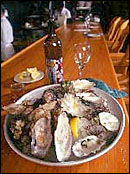Vibrio parahaemolyticus is a bacteria commonly found in coastal marine waters and seafoods throughout the world.
What type of illness does Vibrio parahaemolyticus cause?
This bacteria can make people sick in two ways. If it enters an opening in the skin, it can cause a serious skin infection. This usually happens when a person with a cut or abrasion swims or fishes in seawater containing a high number of these bacteria.
The bacteria can also cause diarrhea in people who eat contaminated seafood. When this happens, the person usually only gets mildly or moderately sick, although some people may become sick enough to be hospitalized. The patient may have symptoms such as diarrhea, abdominal cramps, nausea, vomiting, headache, fever, and chills. The illness lasts from 1-7 days, and usually begins within 12 and 24 hours of eating contaminated seafood, but can range from 4 to 30 hours.
How do people get the diarrheal form of this illness?
In the United States, all the people who we know have gotten diarrhea from this bacteria have eaten raw or improperly cooked shellfish. Or they have eaten cooked fish and shellfish that was contaminated with the bacteria after it was cooked. Most outbreaks have happened because the seafood was allowed to touch other raw seafood, dirty surfaces or utensils, or the seafood was not kept cold enough. If seafood is not kept clean and chilled, the bacteria will grow rapidly in the seafood and can then make people sick. In some cases, seafood can naturally become highly contaminated with these bacteria while it is still in coastal waters before being harvested.
How common are infections with Vibrio parahaemolyticus?
Vibrio parahaemolyticus infections are fairly rare, but they are also under-reported to public health officials. In Texas, we usually have between 2 and 7 cases reported each year. Between 1988 and 1997, a total of 42 individuals were reported with a Vibrio parahaemolyticus infection in Texas. In most years, the majority of reported cases are of people with a skin or wound infection. This year, however, most of the people with this illness have diarrhea from eating raw seafood.
How are Vibrio parahaemolyticus infections diagnosed?
The diagnosis of this illness is made by taking stool samples from a sick person. The stool sample is allowed to grow more bacteria, then is studied in a laboratory. The Texas Department of Health is asking physicians to send stool samples from people who may have this illness to a laboratory. Laboratories must perform a special test on the stool sample to see if the sickness was caused by this bacteria. The Health
Department has told doctors to suspect this illness when patients
complain of diarrhea with fever, if the patient has eaten raw seafood.
How are Vibrio parahaemolyticus infections treated?
Most people can get over this illness without any kind of treatment. However, a few people may be sick enough to be hospitalized and may need extra fluids.
Are there any long term effects associated with Vibrio
parahaemolyticus infections?
No. These are short illnesses, and once you recover you should not expect any long-term effects.
How can I keep from getting this illness?
Only raw seafood can cause this illness, so:
- Cook shellfish (oysters, clams, mussels) thoroughly.
- For shellfish in the shell either boil until the shells open and continue boiling for five more minutes, or steam until the shells open and continue cooking for nine minutes;
- For shucked oysters, boil for at least three minutes or fry them in oil at least 10 minutes at 350 degrees.
- Do not eat shellfish that do not open during cooking.
- Do not allow seafood already cooked to touch raw seafood, and do not touch cooked seafood after you have handled raw seafood without washing your hands first.
Who Should Be Especially Careful?
Certain health conditions put you at risk for serious illness or death if you become sick from eating contaminated raw seafood. People with the following health conditions should not eat seafood that is uncooked:
- Liver disease, either from excessive alcohol intake, viral hepatitis or other causes,
- hemochromatosis, an iron disorder,
- diabetes,
- stomach problems, including previous stomach surgery and low stomach acid,
- cancer,
- immune disorders, including HIV infection,
- long-term steroid use (as for asthma and arthritis).



